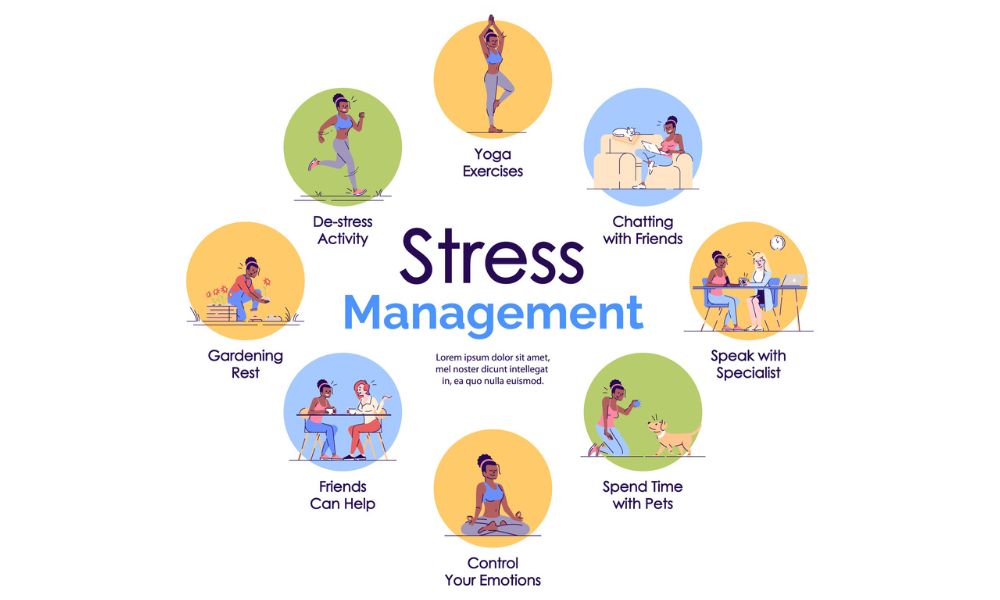In today's fast-paced world, managing anger is a crucial skill for maintaining our mental health and well-being. Hypnotherapy can be an effective method in anger management, helping us understand the root causes of our anger while providing tools to control our reactions. This approach allows us to explore our subconscious mind, uncover hidden triggers, and replace negative thought patterns with healthier responses.

By incorporating hypnotherapy into our anger management strategies, we can develop greater self-awareness and resilience. Techniques such as relaxation exercises can significantly reduce stress levels, enabling us to handle challenging situations more calmly. This method not only benefits our emotional state but also improves our relationships and overall quality of life.
As we look deeper into hypnotherapy and its role in managing anger, we discover valuable techniques that can transform how we perceive and react to anger. With the right guidance, we can learn to channel our emotions constructively and enhance our mental health.
Key Takeaways
- Hypnotherapy helps us identify and understand the triggers of our anger.
- Relaxation techniques are vital for reducing stress and managing emotions.
- Developing self-awareness through hypnotherapy leads to better control over our reactions.
Understanding Anger and Its Impacts

Anger is a natural emotion, but when it becomes excessive or unaddressed, it can lead to various issues in our lives. Recognising what triggers our anger and understanding the consequences of not managing it can help us improve our well-being and relationships.
Identifying Anger Triggers
We often experience anger in response to specific situations or behaviours. Common triggers might include:
- Frustration: Situations that prevent us from achieving our goals.
- Feeling attacked: Criticism or perceived insults, which can make us defensive.
- Feeling powerless: Situations in which we feel a lack of control, such as in traffic or at work.
Road rage is a frequent example where stress accumulates. Events like being cut off in traffic or encountering a rude driver can provoke intense anger. Understanding our personal triggers is crucial, as it allows us to anticipate and work through our emotional responses. By recognising these patterns, we can take proactive steps to manage our reactions and reduce conflict in our relationships.
Consequences of Unmanaged Anger
Failing to address our anger can affect us deeply. It can lead to issues such as:
- Strained relationships: Frequent outbursts can alienate friends and family members.
- Depression and anxiety: Ongoing anger can contribute to feelings of sadness and increased anxiety.
- Low self-esteem: Constant anger may reflect unresolved issues related to self-worth.
When anger manifests, it can make us act in ways we might regret later. We may lash out verbally or physically, harming our connections with others. Recognising these consequences can motivate us to seek help, like hypnotherapy, which can aid in changing our thought patterns. This approach helps in fostering healthier emotional responses and improving our relationships.
Basics of Hypnotherapy

Hypnotherapy is a powerful therapeutic tool that uses hypnosis to help individuals manage their emotions and behaviours, particularly related to anger. Understanding its principles and how it compares to other therapies can provide insight into its effectiveness.
Principles of Hypnosis
Hypnosis involves entering a state of focused attention and heightened suggestibility. In this state, we are more open to positive suggestions that can lead to behavioural changes.
During a hypnotherapy session, a trained practitioner guides us through relaxation techniques to help us access our subconscious mind. This access allows us to identify and modify negative thought patterns that contribute to our anger.
Hypnotherapy relies on the body's natural relaxation response. As we relax, our brain activity shifts, making it easier for us to absorb therapeutic suggestions. This method is often combined with other therapies, such as Cognitive Behavioural Therapy (CBT) and Neuro-Linguistic Programming (NLP), to enhance its effectiveness.
Comparing Hypnotherapy with Other Therapies
When we look at hypnotherapy alongside other therapeutic approaches, we see both unique benefits and similarities. For example, CBT focuses on changing negative thought patterns and behaviours through logical reasoning. It helps us recognise and challenge our thoughts directly.
On the other hand, hypnotherapy works by addressing the subconscious mind, making it easier to change deeply rooted beliefs. While counselling can aid in discussing feelings and developing coping strategies, hypnotherapy actively works on underlying issues from a different angle.
Each therapy has its strengths. We often find that combining hypnotherapy with therapies like CBT or NLP provides a more rounded approach to managing anger and other emotions. This combined method can lead to lasting change and better emotional regulation.
Hypnotherapy in Managing Anger

We can harness hypnotherapy as a powerful tool for managing anger. This approach helps us understand the root causes of our anger while also providing effective coping strategies. By using specific techniques, we can reshape our emotional responses and improve our overall emotional regulation.
How Hypnotherapy Targets Anger
Hypnotherapy works by accessing the unconscious mind to identify triggers for our anger. Through this process, we can uncover deep-seated beliefs that may cause excessive anger responses.
During sessions, a trained hypnotherapist guides us into a relaxed state. This allows us to reflect on our emotions and thoughts more clearly. As we engage with these feelings, we learn to recognise patterns and behaviours that lead to anger.
By using cognitive restructuring, we can change the way we think about situations that normally provoke anger. When we reframe these thoughts, we’re more equipped to handle our emotions positively. This method not only helps manage immediate feelings of anger but also influences our long-term emotional health.
Techniques in Hypnotherapy for Anger
In hypnotherapy, various techniques can aid our journey toward better anger management. One effective method involves visualisation techniques. We might imagine calming scenes or positive outcomes in situations that typically trigger anger. This practice can help reduce anxiety and promote a sense of peace.
Another key technique is suggestion therapy. In this process, the hypnotherapist provides us with calming suggestions while we are in a relaxed state. These can reinforce positive self-talk and encourage emotional regulation.
We can also engage in self-hypnosis techniques. This allows us to use hypnotherapy skills independently outside of professional sessions. By practising these methods regularly, we build stronger coping strategies for handling anger and stress in our daily lives.
Developing Self-Awareness and Control

In our journey to manage anger effectively, developing self-awareness and control is crucial. This process helps us recognise our emotions and build confidence in our ability to handle them. We can learn techniques to strengthen our self-esteem and regulate our emotions better.
Building Self-Esteem
Building self-esteem is essential for managing anger. When we feel good about ourselves, we are less likely to react aggressively. We should practise positive self-talk, focusing on our strengths and achievements.
Creating a list of our positive qualities can reinforce this. Set small, achievable goals for ourselves and celebrate each success. This helps to build a sense of accomplishment and boosts our confidence.
Engaging in activities we enjoy also contributes to our self-esteem. Whether it’s a hobby or socialising with friends, these positive experiences remind us of our worth.
Emotion Regulation Techniques
Using emotion regulation techniques can significantly improve our anger management skills. One effective method is deep breathing. When we feel anger rising, taking slow, deep breaths helps calm our mind and body.
Another technique is to practise mindfulness. Being present in the moment allows us to observe our emotions without acting on them immediately. We can identify triggers and recognise patterns in our responses.
We can also use journaling to express our feelings. Writing about our thoughts can offer clarity and help us find constructive ways to address them.
Learning to set healthy boundaries with others is vital. Clear boundaries can prevent situations that may lead to frustration or anger. By implementing these techniques, we enhance our ability to control our responses.
Techniques and Tools for Relaxation
In managing anger, incorporating effective relaxation techniques is crucial. These tools help reduce stress and promote calmness, allowing us to handle emotions more constructively. We will explore specific relaxation techniques used in hypnotherapy and the importance of practising relaxation consistently.
Relaxation Techniques in Hypnotherapy
In hypnotherapy, we use various relaxation techniques to help clients achieve a state of calm. One popular method is guided visualisation. This involves leading clients through calming imagery to promote relaxation. For instance, we might ask them to imagine a serene beach or a peaceful forest.
Another technique is progressive muscle relaxation. Here, we guide clients to tense and then relax different muscle groups. This not only helps to relieve physical tension but also eases mental stress.
Deep breathing exercises are also effective. Focusing on slow, deep breaths can help regulate heart rate and reduce anxiety. Through these techniques, we aim to create a safe mental space, helping clients respond to anger in healthier ways.
Practising Relaxation Consistently
Practising relaxation regularly can greatly enhance our ability to manage anger. We recommend setting aside a few minutes each day to engage in relaxation techniques. Consistency is key to experiencing long-term benefits.
We can create a calming routine that includes activities like meditation, yoga, or even simple breathing exercises. Finding a quiet space where we feel comfortable can make this practice more effective.
Additionally, we encourage the use of relaxation apps or recorded sessions. These resources can guide us through techniques, making it easier to maintain our practice. By incorporating relaxation into our daily lives, we build resilience against stress and improve our overall emotional well-being.
Building Resilience and Coping Mechanisms
In managing anger, we need to focus on building resilience and effective coping mechanisms. Strengthening these skills helps us deal with stress and anxiety while responding to anger in healthier ways.
Coping with Stress and Anxiety
Stress and anxiety can trigger anger. To combat this, we can use specific coping mechanisms. Techniques such as deep breathing, mindfulness, and progressive muscle relaxation help us regain control.
Deep Breathing Exercise
- Inhale deeply for a count of four.
- Hold for four counts.
- Exhale slowly for six counts.
This technique calms our mind and lowers stress levels. Journaling also allows us to express feelings openly, reducing internal tension.
Additionally, physical activity such as walking or yoga helps release built-up stress and improve our mood. Creating a routine can also provide stability, helping us manage daily pressures effectively.
Enhancing Personal Resilience
Resilience allows us to bounce back from setbacks. We can enhance our resilience by building strong connections with friends and family. Supportive relationships give us a safety net during tough times.
Setting realistic goals for anger management is crucial. We should break down our goals into smaller, achievable steps. Recognising our progress, no matter how small, boosts our confidence and encourages persistence.
Practising self-care is another essential component. Regularly engaging in activities we enjoy—such as reading, hobbies, or spending time in nature—nourishes our emotional well-being. Approaching challenges with a growth mindset allows us to learn from experiences, making us better equipped to face future obstacles.
Case Studies and Efficacy
In exploring hypnotherapy for anger management, we can look at real-life success stories and the scientific evidence that supports its use. These insights can help us appreciate the effectiveness of hypnotherapy in managing anger.
Success Stories in Hypnotherapy for Anger Management
Many individuals have shared their experiences with hypnotherapy, illustrating its potential to transform how they handle anger. For instance, one case involved a man in his forties who struggled with frequent outbursts at work.
After several hypnotherapy sessions, he reported a significant reduction in his anger levels. Instead of reacting impulsively, he learned to pause and assess his feelings.
Another success story features a woman who faced challenges in her family relationships due to her temper. Through hypnotherapy, she discovered coping strategies and techniques to remain calm during conflicts. These stories highlight how hypnotherapy provides tailored solutions that resonate with each individual's needs.
Clinical Evidence and Research Findings
Research supports the efficacy of hypnotherapy for anger management. A meta-analysis revealed that hypnotherapy can positively influence mental health outcomes.
Studies have demonstrated significant reductions in anger and aggression after participants underwent hypnotherapy. For example, one study indicated that 75% of participants experienced lower anger levels after eight sessions.
Further research emphasises the role of hypnotherapy in enhancing emotional regulation. It helps individuals recognise their triggers and develop healthier coping mechanisms.
These findings encourage us to consider hypnotherapy as a viable option for those struggling with anger management issues.
Getting Started with Hypnotherapy
Beginning hypnotherapy for anger management involves careful selection of a qualified practitioner and understanding what to expect in your first visit. This process lays the groundwork for effective therapy and ensures we are prepared for the journey ahead.
Choosing the Right Hypnotherapist
Selecting the right hypnotherapist is crucial. We should look for professionals with proper qualifications and certification in hypnotherapy. In the West Midlands, many practitioners are experienced in anger management.
Consider their specialisations and past client reviews. It's important to feel comfortable with our chosen hypnotherapist. A good rapport can enhance our experience. We should also check if they offer a free initial consultation, which can help us gauge their approach.
Questions to ask when choosing a hypnotherapist:
- What qualifications do you have?
- How much experience do you have with anger management?
- Can you provide references or testimonials?
These steps will guide us towards making the best choice for our needs.
What to Expect in an Initial Consultation
During our initial consultation, we can expect a welcoming environment. This meeting is designed for the hypnotherapist to learn about our specific challenges with anger. They will ask questions about our history, triggers, and how anger affects our lives.
The session will typically last around 60 minutes. We should feel free to express our concerns and ask questions. The hypnotherapist will explain their approach and how hypnotherapy can help us.
Expect to discuss our goals and what we hope to achieve from therapy. By the end of this session, we should have a clearer understanding of the process and feel more at ease regarding the therapy ahead.
Frequently Asked Questions
We understand that many people have questions about using hypnotherapy for anger management. Here, we address common concerns and provide clear answers based on the latest insights and practices in the field.
How effective is hypnotherapy in managing anger issues?
Hypnotherapy can be quite effective for some individuals in managing anger issues. Research shows that many find it helpful in understanding triggers and changing negative thought patterns linked to anger. Personal experiences vary, so effectiveness can differ from person to person.
What techniques are used in hypnotherapy to address anger?
In hypnotherapy, several techniques are used to address anger. These can include guided imagery, suggestion therapy, and mindfulness practices. Each technique aims to help individuals gain better control over their emotions and develop coping mechanisms.
Are there any risks associated with using hypnotherapy for anger control?
Generally, hypnotherapy is considered safe when performed by a qualified practitioner. However, some individuals may experience temporary discomfort or anxiety during sessions. It is essential to discuss any concerns with a therapist beforehand.
How long does it typically take to see results from hypnotherapy for anger management?
The time to see results from hypnotherapy varies widely. Many may notice improvements after a few sessions, while others might require more extended treatment. Consistency and engagement in the process play significant roles in achieving effective outcomes.
Can hypnotherapy for anger management provide long-term benefits?
Hypnotherapy can provide long-term benefits for managing anger, especially if combined with follow-up sessions and continued self-reflection. Many individuals report lasting changes in their responses to anger-triggering situations.
Is hypnotherapy suitable for everyone seeking help with anger management?
Hypnotherapy may not be suitable for everyone. Individuals with certain mental health conditions or those unwilling to engage in the process may not benefit as much. It is important to consult with a trained professional to determine if this approach aligns with personal needs.





















